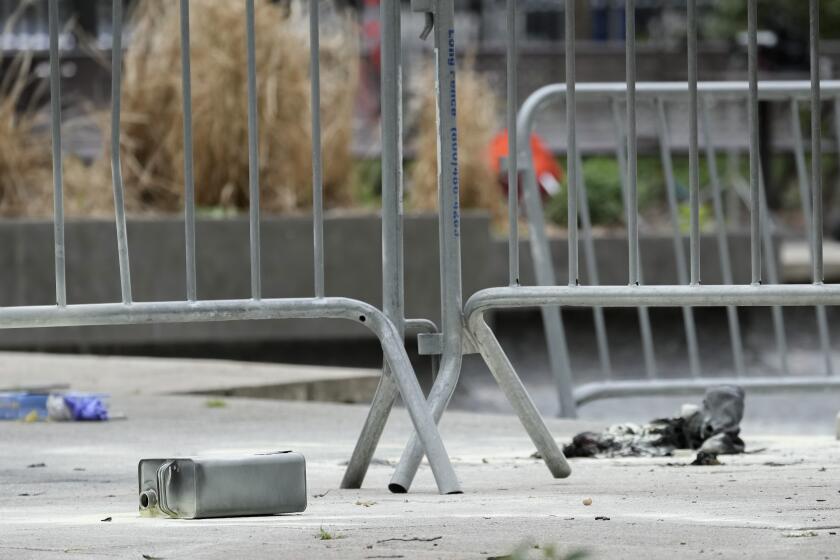Essential Politics: California’s tax fights are back

This is the May 17, 2021, edition of the Essential Politics newsletter. Like what you’re reading? Sign up to get it in your inbox three times a week.
Monday marks the federal and state deadline to file income taxes, the second consecutive year of an extended tax season due to the COVID-19 pandemic.
And by the time Gov. Gavin Newsom and state lawmakers strike a deal next month on a new state budget, analysts will have a pretty clear snapshot of another expected huge windfall of revenues — largely paid by California’s wealthiest residents.
Get our L.A. Times Politics newsletter
The latest news, analysis and insights from our politics team.
You may occasionally receive promotional content from the Los Angeles Times.
But the status quo on taxes may not be good enough, either for liberal Democrats in the Legislature or some of the Republican hopefuls seeking to replace Newsom in a special recall election later this year.
Few topics have such a rich political history in California as taxation, with fierce battles over who pays how much and where it goes. At the center of this year’s debate is Newsom, who wants to redistribute the expected windfall to those most in need while holding the line at more provocative ideas being floated in Sacramento and on the campaign trail.
Big bucks, big plans
Newsom’s revised state budget released last week offers a snapshot of tax revenues in what feels like an alternate world for those who saw California’s government finances decimated through two major recessions in the previous decade.
To wit, the new estimates, when compared with January budget projections, show:
- $38 billion more in personal income tax revenues
- $4.5 billion more in sales tax receipts
- $4.6 billion in additional corporation tax revenues
Those are California’s three biggest sources of state government funding. More than half of the surprise revenue is expected to show up in the current fiscal year, with the rest in the budget cycle that begins July 1.
Measuring California’s tax burden is complicated and quickly becomes a political hot potato. But one way to step back from the intensity of those debates is to review the historical information on tax collections, compiled annually by the California Department of Finance.
The 2021 estimate is a tax burden of $4,738.54 per person, an increase of about $300 from 2018. The per capita tax collected crossed the $4,000 threshold in 2017; $3,000 in 2006, though it dipped below that number for a couple of years during the Great Recession; and the $2,000 threshold in 1998.
But when viewing taxes per $100 of income, the changes have been more subtle. State officials estimate Californians pay $7.19 of taxes for every $100 they earn — a number that’s fluctuated in the $6 to $7 range for the better part of the last half a century, dropping to $5.91 in 2008 and rising to $7.97 in 1999.
Those are, of course, averages per state resident, though that’s not how taxation works. California taxes high-income earners more and treats their investment success the same as other income, and it’s their successes during the pandemic that have led to the huge windfalls in Newsom’s latest projections.
“That’s the nature of our progressive tax system,” Newsom said Friday when I asked him about the reality that his new tax rebate proposal redistributes excess revenues from those who paid to those who didn’t.
And to the state’s high-income earners, he said this: “I want to thank those taxpayers, thank them for their hard work, thank them for the generosity of spirit, thank you for their innovation, their contributions for their investments, their risk-taking, and Californians are all the beneficiaries.”
Tax rebates, tax cuts
Newsom’s new budget allocates more than $8 billion in tax rebates to taxpayers with a 2020 adjusted gross income of no more than $75,000 and who did not receive a $600 stimulus check this year. Families with kids would get more; residents lacking legal immigration status would receive a little less.
The money comes from the rules first enshrined in the California Constitution in 1979, setting a government spending limit and mandating tax rebates (later amended to include a portion set aside for schools) when revenues are collected above that limit.
Newsom didn’t directly answer my question Friday about concerns that the rebates aren’t going back to all taxpayers, a decision some have suggested may not follow the letter of the law.
But one of his GOP rivals, former San Diego Mayor Kevin Faulconer, proposed last week to go further, to abolish state income taxes for individuals earning less than $50,000 and families earning less than $100,000.
“We have to make California less expensive. California is literally taxing people out of our state,” he said at a Wednesday news conference, two days before Newsom sent his revised budget to the Legislature.
Republicans have often embraced tax cuts, though not so often ones exclusively aimed at lower-income earners. While no independent analysis of Faulconer’s plan has been conducted, the GOP hopeful said it would reduce state tax collections by $15 billion a year.
Enjoying this newsletter? Consider subscribing to the Los Angeles Times
Your support helps us deliver the news that matters most. Become a subscriber.
Tax increases in Sacramento? Newsom says no
On the other side of the equation, a variety of tax increases have been proposed by Democrats in the Legislature, though legislative leaders are unlikely to send many of the proposals to Newsom’s desk in the heat of a gubernatorial recall campaign.
The most sweeping is a bill by freshman Assemblyman Alex Lee (D-San Jose) to enact a “wealth tax” on those with a global net worth of $50 million or more.
“Even during a global pandemic, the rich get hideously richer and the poor get miserably poorer. Common sense measures like our Wealth Tax need to be passed to democratically share the wealth,” Lee posted on Twitter last month.
Not that anyone else has mentioned it, but note that Lee estimates his proposal would generate $22 billion in new revenues — just a bit more than the $15 billion reportedly lost by Faulconer’s plan to eliminate taxes on five-figure incomes.
Newsom’s response, at least to new taxes? No.
“When you are enjoying a $76-plus billion, and growing, operating surplus, I don’t think it’s time for new tax increases,” the governor said Friday.
So what do Californians think? Fifty-two percent of adults surveyed in March by the nonpartisan Public Policy Institute of California said they’d choose higher taxes and more government services over lower taxes and fewer government services.
Today’s essential California budget news
— Newsom’s plan for more stimulus checks was quickly followed by a plan for $5 billion in rental assistance and $2 billion to help those who can’t pay their utility bills.
— The new budget proposal calls for transitional kindergarten, currently available only to about one-third of California’s 4-year-olds, to be expanded to all eligible children by the 2024 academic year.
— The governor wants legislators to approve a $12-billion proposal to create affordable housing, increase mental health services and fund other programs to bring the state’s homeless people off the street.
— The new state budget proposal lays out a vision of expansive government aid, turbocharged by the COVID stimulus bill championed by President Biden.
— Newsom’s new budget calls for adding $1.5 billion to a program providing grants of up to $25,000 to small businesses harmed by the COVID-19 pandemic in California.
— Newsom’s plan for an $859-million expansion of Medi-Cal eligibility to cover adults 60 or older regardless of immigration status differs from Democrats who have long pushed for including all adult immigrants, a potential $2-billion effort they say they will push for more during budget negotiations.
— California’s public colleges and universities would receive a massive funding boost to expand affordable student housing, repair aging facilities, better train students for workforce needs and shift Humboldt State to a technology focus under the governor’s budget plan.
National lightning round
— Rochelle Walensky, the director of the Centers for Disease Control and Prevention, defended the decision to ease mask-wearing guidance for fully vaccinated people, stressing that political pressure had nothing to do with the abrupt shift.
— Dr. Anthony Fauci said Sunday that “the undeniable effects of racism” have led to unacceptable health disparities that especially hurt Black, Latino and Native Americans during the pandemic.
— The Republican who now leads the Arizona county elections department targeted by a GOP “audit” of the 2020 election results on Saturday called a statement by former President Trump accusing the county of deleting an elections database “unhinged.”
— In 2020, election officials tried to make voting easier and safer amid a global pandemic. Next time, they might get fined or face criminal charges.
— States led by Democrats are acting to remove restrictions to the ballot — in marked contrast to many Republican-controlled states that are moving in the opposite direction.
— A Florida politician who emerged as a central figure in the federal investigation into Rep. Matt Gaetz has agreed to cooperate with federal investigators and admits to paying an underage girl to have sex with him and other men, according to court documents filed Friday.
Stay in touch
Keep up with breaking news on our Politics page. And are you following us on Twitter at @latimespolitics?
Did someone forward you this? Sign up here to get Essential Politics in your inbox.
Until next time, send your comments, suggestions and news tips to politics@latimes.com.
Get the L.A. Times Politics newsletter
Deeply reported insights into legislation, politics and policy from Sacramento, Washington and beyond. In your inbox three times per week.
You may occasionally receive promotional content from the Los Angeles Times.




